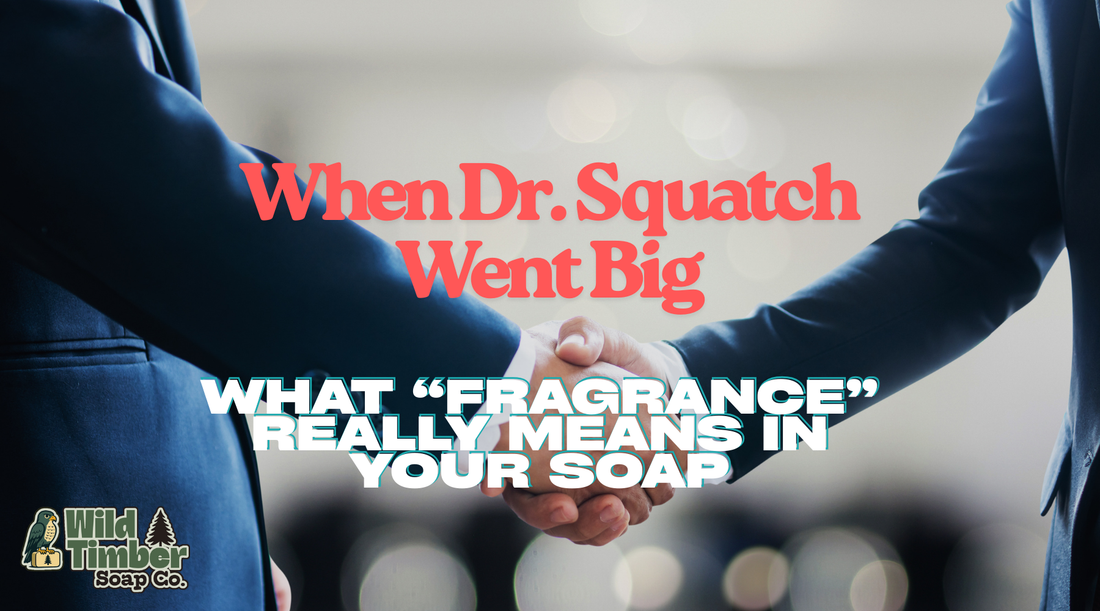
When Dr. Squatch Went Big: What “Fragrance” Really Means in Soap
Share
In June 2025, Unilever announced its acquisition of Dr. Squatch, one of the most recognizable men’s grooming brands of the last decade. The news made waves not just in the business press, but also among everyday customers who started questioning what “natural” really means when it comes to soap.
This conversation is long overdue, because there’s one little word that can mean almost anything: fragrance.
The “Fragrance” Loophole
According to the U.S. Food & Drug Administration, “fragrance” (sometimes listed as parfum) is a broad term that allows companies to group multiple scent chemicals under one single label line. The truth is simple: you don’t know what’s in it, and neither do we. A fragrance listing could represent a handful of natural essential oils, or it could represent dozens of synthetic compounds blended together. Without disclosure, there’s no way for the customer to tell the difference.
What makes this even murkier is that the word “natural” has no legally binding definition in cosmetics. In practice, “natural fragrance” could still include synthetics, preservatives, or additives. To the average shopper, the label feels safe and reassuring. But legally, it doesn’t guarantee transparency.
Why Sensitive Skin Struggles With Fragrance
Dermatologists often give the same first piece of advice to patients with eczema, psoriasis, or other sensitive skin conditions: avoid products with fragrance. It’s not that every fragrance will cause irritation for every person, but fragrance compounds are among the most common skin irritants. For many people, avoiding that single line on the label can mean calmer, healthier skin.
This advice reflects the reality of how unpredictable fragrance blends can be. Without knowing exactly what’s inside, dermatologists prefer to recommend fragrance-free products as a baseline.
Wild Timber’s No-Compromise Approach
At Wild Timber Soap Company, we don’t play that game. You will never see “fragrance” on our labels.
Instead, we list exactly what creates each scent. If you’re holding a bar of Emerald Bay Pine, you’ll see pine essential oil and black spruce essential oil on the label, nothing else. Our Birch Breeze bar? Birch essential oil, clearly spelled out. Cedar & Smoke? Cedarwood and a smoky natural note, with nothing hidden.
We believe your skin deserves honesty. That means every scent source is named. No loopholes. No guesswork. No vague promises.
Why Handmade Soap Matters
Our approach goes deeper than just avoiding fragrance. We make handmade, real soap, small-batch bars crafted here in St. Louis with natural oils, clays, and essential oils. We value our skin too much to compromise with shortcuts, and we extend that same philosophy to you.
Every Wild Timber bar is designed with purpose:
-
Stronger skin barrier support from natural oils and butters.
-
Scent transparency with essential oils, not chemical laden.
-
Crafted for men who want effective, rugged clean without the skin damage that comes from mass produced detergents.
This is soap that matches the life you live outdoors, refreshing after a trail, comforting after a long day’s work, or grounding after the gym.
The Bottom Line
The acquisition of Dr. Squatch by Unilever is big news in the men’s grooming world. But the bigger story is about fragrance — a word that can mean almost anything, and one that’s better avoided if you want control over what touches your skin.
At Wild Timber, we do things differently. Our bars are handmade in St. Louis, with no synthetic fragrance, no compromises, and no secrets. Just real soap for real men.
👉 Ready to ditch “fragrance” for good?
Shop our lineup of outdoor-inspired scents — Choose 5 for $32 — and join Trailhead Rewards to earn Timber Tokens with every bar.


